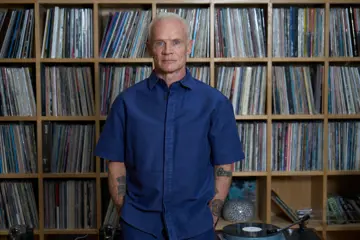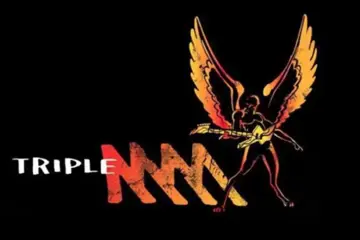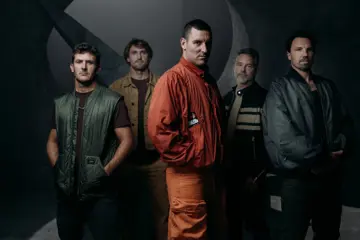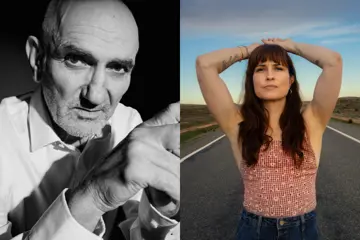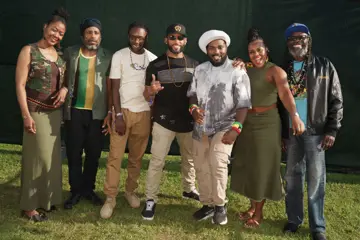A black-garbed, corpse-painted person strums a guitar in the dead of night; film grain shimmers and ripples across distorted silhouettes; and the hazy lo-fi of analogue-era instrumentation harkens back to a bygone era of music-making where psychedelics-fuelled performers sought to explore self and sound in equal measure.
These are just some of the components that make up the spaced-out elements of independent artist Laguna’s latest release Sweetlips, a grooving single that echoes the crackling spirit of late 1960s-era recordings.
Tracking the song in its entirety, James Guida is the one-man-band behind the Laguna project, a recording vehicle which “digs deep into themes of rebellion, isolation, and the beauty of decay.”
With its grimy, “lost footage” presentation in direct opposition to the crystal-clear, idealised visions found in so much of modern media’s mining of the past, Sweetlips, is decidedly on the less glamourous side of past-century nostalgia.
But by his own admission, Guida insists the song is an attempt at reaching out to a broader audience albeit in his own idiosyncratic way.
Don't miss a beat with our FREE daily newsletter
“I was trying to poke my head out of the noise,” he explains. “I was finding it seemingly difficult to be seen or heard at all so I thought, ‘Alright, I’ll just make something that’s undeniably going to fit within the rest of the spectrum but obviously has my own spin on it.’”
Guida, probably like many creatives, spent much of his formative years feeling like an outsider. “I was not particularly accepted in my teens,” he says of growing up in the coastal Victorian city of Geelong. “Not until I got older did I realise that actually I was pretty severely ostracised. It's always been normal that if I wanted to do something, I'd have to do it on my own.”
This “do-it-yourself” mentality pervades Guida’s entire approach to making music; from releasing Laguna’s output through his Mountain Girl Records imprint; to learning the ins and outs of recording techniques in order to self-produce; to overseeing the presentation of his physical releases.
While making Laguna’s debut eight-track cassette Orphan To The Sunshine, released in February last year, Guida personally loaded the tapes onto each copy.
With its fuzz-laden guitar and grooving psych sounds, Sweetlips may wear its retro influences of Thin Lizzy and the recently-resurgent Black Sabbath on its film grain-encrusted sleeve – but the single, as well as Laguna’s entire audiovisual aesthetic, actually owes an enormous debt to a more obscure influence.
Growing up in the nascent days of the internet amid Geelong’s skating culture, Guida was engrossed in a scene where the sharing of DIY music videos wasn’t an uncommon sight.
“A lot of us didn’t go to school a lot, and a lot of us would be marching around in Geelong city with groups of sometimes 50 people or more, just skateboarding,” Guida says. “[My approach] all comes from the skate scene and everybody doing everything on their own.
“We were glued to magazines like Thrasher or Slam Skateboarding Magazine. Skate videos… were becoming large, and it was right at the time where handicams became very nimble and having one at home was possible.”
Guida adds that the growing accessibility of readily-available filming gear, coupled with the home video scene born out of skating culture, provided the perfect storm of inexpensive creativity.
“Once that happened, in conjunction with viewing skate films, it was only natural for any skater to be making video clips,” he says. “So, from an early age, there were quite a few of us who got to see ourselves on camera a lot from these skate clips that were merged with our favourite music which was always obscure ‘60s music at the time.”
Following in the footsteps of other Geelong-bred underground groups like Frowning Clouds, Bananagun, Alien Nosejob, and partly King Gizzard & The Lizard Wizard, Guida admits he was “late to the party” in jumping on the music bandwagon, making his first-ever recordings “in silence” in 2015 by way of a four-track cassette title Can Of Sperm released under Laguna’s precursor project, Environments.
Developing into a three-piece band, Environments played several shows in Melbourne and Sydney before Laguna’s establishment in 2018. The group played a string of shows before Guida reenvisioned the project as a primarily solo act.
“I turned my back, in a sense, on the live situation with other people,” he says. “With Laguna, if I make the songs on my own, they turn out a certain way and somebody who’s playing the songs, if they play too differently, it sounds entirely different. I think I’m very attached to the way things sound.”
The seeds of Guida’s self-reliant recording setup were planted when a friend, “[started his] brain into recording mode,” after which he discovered artists like Kevin Parker, Prince, and Todd Rundgren, all of whom created albums entirely by themselves in the execution of their singular creative ambitions.
“I just took that as a sort of salute from the universe, that it’s possible,” Guida says. “That paired with not having any money made me decide that if I was to obtain the knowledge to do it myself, I wouldn’t have to outsource to other people.”
Practicing and recording out of a nearly-two-acre property in Drysdale just outside Geelong, which he shares with The Murlocs drummer Matt Blach, Guida has accumulated an array of vintage gear in order to bring his VHS-mastered vision to life.
He’s used the same recording motherboard since 2013, a TASCAM 688 MIDIStudio eight-track recorder, initially released in the early 1990s – which Guida refers to as “the pinnacle of cassette home recording” – and boasts retro equipment favoured by the likes of Neil Young and Led Zeppelin to help “colour” his nostalgic sound.
“I think people thought when I put out the last Laguna recording, that I don’t know how to record,” Guida says. “They didn’t realise what I was trying to do was make some degraded-sounding recordings that sounded like lost gems of the past.”
Sweetlips’ visual design, with its VHS-filtered grain and hazily constructed imagery, is also a deliberate choice, offering a fiercely analogue alternative to a world seemingly hellbent on achieving faultless presentation by way of social media filters and AI prompting.
“It comes from a place where I’m worried we as a collective are losing touch with where we’ve just come from and the sort of things we liked to do,” Guida explains. “It’s the fear of arriving at a place where that becomes too hard for everybody.”
Ultimately, Guida’s mission statement stems from wanting to help others to unlock their own creative potential, producing accompanying materials to his releases that “[encourages] listeners to not just hear the music, but interact with it.”
His fiery handcrafted typeface adorning Sweetlips’ artwork and music video is packaged alongside the song’s digital release, and, once purchased, is able to be employed however one sees fit. Orphan To The Sunshine, prior to that, included a sticker pack, zine and bookmark, all in the name of preserving a “deeply tangible” listening experience.
“It’s important that other young people trying to figure out what they want to do in the world, that I can use myself as a vessel to present examples of certain approaches to production,” Guida says. “It comes back to trying to promote the idea that you can do it; you don’t need other people to do it; you have the beauty in you to do something lovely.”
Despite taking six months of work, including three to record, Guida, who typically spends a considerable amount of time in figuring out his songs, asserts Sweetlips was something of a spontaneous interruption for him.
“It just came uninvited, demanded to be made,” he says.
With his earworm distraction now out of the way, Guida has returned to his next undertaking – an upcoming single followed by an LP, both to be titled Zebra. The former is expected to drop August 25; the latter, by the end of the year.
“If I tell you [the title] now, then it’ll definitely have to be called Zebra,” Guida chuckles.
With the aim of nurturing a creative community through his output, Guida’s next album, he hopes, will signal a step closer to that sense of collaboration with a planned return to group-focused live shows to accompany Zebra’s album-length release.
“For me, it comes from a deep place of wanting to feel like I belong somewhere,” he says. “At the end of the day, it’s choose your weapon.”
This piece of content has been assisted by the Australian Government through Music Australia and Creative Australia, its arts funding and advisory body




